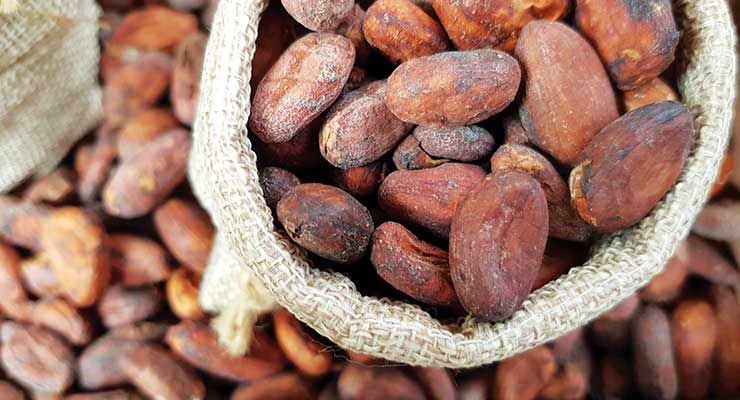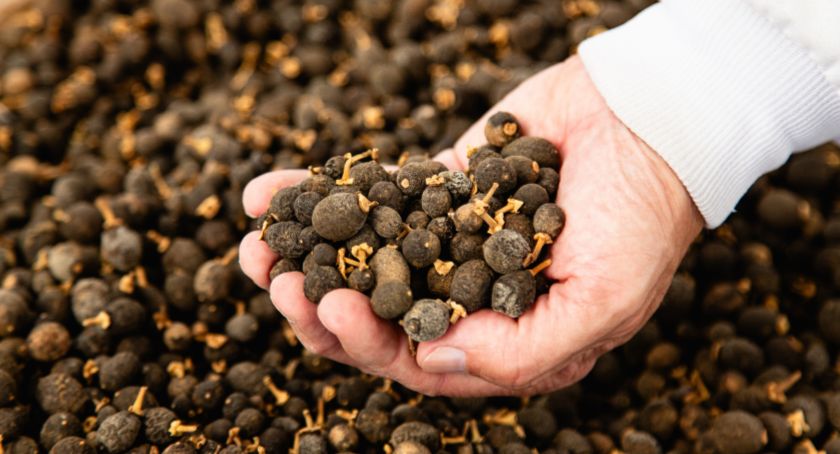Features
Cocoa Flavanols: Manufacturing Process & Supply Chain Make or Break Benefits
High quality ingredients sourced from reliable partners will ensure delivery of research-supported health benefits.
Flavanols, specifically cocoa flavanols, are one of the most intriguing bioactive compounds used in functional food products and dietary supplements.
Decades of research and more than 100 published studies have demonstrated the benefits of daily cocoa flavanol consumption, including supporting a healthy heart, as well as healthy blood pressure, brain health and cognition, circulation, and skin health.
Research Shows Cocoa Flavanols Get Blood Flowing
Flavanols are made of certain isomers, of which (–)-epicatechin in particular has been attributed to positive cardiovascular and blood vessel benefits. When flavanols are consumed, they are quickly absorbed and transformed into a range of metabolites. These flavanol metabolites quickly go to work, increasing the levels of nitric oxide in the body, a compound that triggers the muscles in the arterial walls to relax, or dilate. This process facilitates the healthy flow of blood, oxygen, and nutrients throughout the body.
Numerous studies have been done on cocoa flavanols and cardiovascular health. Research published in the British Journal of Nutrition explored how cocoa flavanols (specifically 450 mg twice-daily) could support cardiovascular health in middle-aged men and women.1 The one-month study showed a cocoa flavanol supplement could improve endothelial function and that the intake of cocoa flavanols was also shown to support healthy blood pressure and cholesterol levels. Another study published in the Journal of the American Aging Association (AGE) showed that cocoa flavanols could address some of the impacts of normal aging on the cardiovascular system in healthy elderly adults, highlighting the potential of dietary flavanols to maintain cardiovascular health with age.2
Because healthy blood flow is important throughout the body, researchers have also explored how cocoa flavanols can affect brain health. Data published in Nature Neuroscience demonstrated the daily intake of cocoa flavanols for 12 weeks was shown to improve cognitive performance, with evidence that cocoa flavanol intake can help support memory benefits.3
Further, the daily intake of cocoa flavanols for just eight weeks led to significant improvements in executive cognitive function in older adults ages 60-85 years, demonstrating that meaningful cognitive benefits can be achieved with the addition of cocoa flavanols to the habitual diet of healthy adults. In the study, published in The American Journal of Clinical Nutrition, researchers found several cognitive benefits, including that cocoa flavanol consumption significantly improved subjects’ ability to recall words.4
Cocoa flavanols can also play a role in supporting healthy aging when it comes to skin health. In a study published in The Journal of Nutrition when people consumed about 300 mg of cocoa flavanols for 12 weeks, researchers observed an improvement in multiple markers of skin quality, including decreased skin roughness and scaling. Improved skin hydration and moisture retention, as well as endogenous photoprotection benefits, were also seen.5
One of the key points to note in all of these studies is that improvement was established in a relatively short amount of time—some in as little as one month—demonstrating the power of flavanols in high concentration as part of a daily routine. Also important is that the studies showed daily cocoa flavanol consumption was safe and well-tolerated in various populations, including in older adults and in people living with conditions such as diabetes.
Findings from recently completed and in-progress studies will provide even more insight into the benefits of cocoa flavanols, including one that follows up on an earlier study from 2015 that demonstrated meaningful improvements in memory after 12 weeks of daily consumption of cocoa flavanols. Additionally, results from the COSMOS trial, an 18,000-participant dietary intervention clinical study investigating the effects of cocoa flavanols and multivitamins on health, is expected to be reported in 2021.
From Farm to Factory, Maximizing Flavanols
As research continues to showcase the benefits of cocoa flavanols, it is important to note that not all flavanol sources are created equal. In addition to flavanols found in cocoa, foods like green tea, apples, grapes and grapeseed also contain flavanols, but each one has a unique composition. This diversity of composition means that flavanol sources vary in amounts, in efficacy, and in safety. As mentioned earlier, to derive the health benefits that have been cited in research, it is important that sources not only contain a high amount of flavanols but that they also contain (–)-epicatechin.
Additionally, the quantity of flavanols actually absorbed depends on many factors, including: cocoa processing; the food matrix (whether it’s a solid vs. beverage, and the fat, protein and carbohydrate content); and the amount of flavanols people eat or drink.
Even among cocoa and chocolate sources, the amount of cocoa flavanols can vary significantly. For example, the average cocoa flavanol content in natural cocoa powder is about 2,000 mg/100 g or 20 mg/g, of which less than 10% is (–)-epicatechin. Mars’ proprietary cocoa extract contains 45,000-50,000 mg/100 g, or 450-500 mg/g cocoa flavanols, of which about 15-20% is (–)-epicatechin. This proprietary cocoa extract is more than 20 times more concentrated than even a natural (non-alkalized) cocoa powder, with nearly twice the level of (–)-epicatechin. Therefore, it is important for the industry and consumers to understand the levels of cocoa flavanols to make the best choice.
An independent provider of test results and information for health and nutrition products, ConsumerLab.com, completed a review of dark chocolate, cocoa powder, nibs, extracts, and supplements that focused on the quality and safety of these flavanol sources. Findings showed that many cocoa products had significant variability in their concentrations of flavanols per serving. Therefore, it would take considerable amounts, or multiple servings, to achieve the flavanol levels supported by research to be beneficial to health—which may or may not be recommended, or even practical, on a daily basis. Additionally, many products contained high levels of the harmful contaminant cadmium.
Part of the problem with traditional manufacturing processes for making chocolate and most cocoa products is that the flavanol compounds are quite delicate. They can easily be destroyed when exposed to extreme heat, oxidation, pH changes, and isomerization.
As such, researchers at Mars Inc. developed the proprietary Cocoapro extraction process, and a secure, traceable supply chain. This has enabled the company to create a concentrated cocoa flavanol extract with best-in-class product purity and the highest level of cocoa flavanols per serving available.
For example, most farmers deliver deliberately fermented beans and dry beans over many days before they are sold. These steps dramatically reduce the levels of flavanols available in the beans.
Alternatively, in the Cocoapro process used to make cocoa extract, obtaining high flavanol beans begins at the origin, which for cocoa extract is Indonesia. In Indonesia, Mars maintains close relationships with local farmers, ensuring that high quality begins within the farm. During the harvest season, fresh beans are brought to a Mars collection site wet, and are then dried within 24-48 hours of receipt for a “farm-to-factory” approach, preserving more of the cocoa flavanols found naturally in the cocoa bean. From there, the beans are carefully roasted, the fat is removed, and then the cocoa flavanols are carefully extracted to produce a highly consistent and concentrated extract. All along the way, the beans and the extract are tested to ensure high levels of flavanols and a low level of contaminants (contaminants such as heavy metals and pesticides, which are not uncommon in cocoa growing).
Sourcing & Science: Ingredients for Success
As consumers increasingly turn to supplements as part of their focus on “self-care” rather than “health-care,” we expect there will continue to be more scrutiny on products beyond what the labels say. The key ingredients to success will be sourcing and science to ensure that high amounts of guaranteed flavanols make their way into the final product, with benefits backed by decades of research from some of the most esteemed institutions globally.
Catherine Kwik-Uribe, PhD, is Global R&D-Scientific & Regulatory Affairs Director, Mars Symbioscience, a business within the Mars Edge segment of Mars, Incorporated. Mars Edge is dedicated to human health and wellness through targeted nutrition, including scientific research on the health and biomedical potential of cocoa flavanols. Dr. Kwik-Uribe received her doctorate degree in human nutrition from the University of California, Davis, and was a postdoctoral fellow at the University of California, Santa Cruz, in the Department of Toxicology. For more information, visit www.cocoavia.com.
References
- Sansone, R., Rodriguez-Mateos, A., Heuel, J., et al. (2015) Cocoa flavanol intake improves endothelial function and Framingham Risk Score in healthy men and women: a randomised, controlled, double-masked trial: the Flaviola Health Study, British Journal of Nutrition 114, 1246–1255 https://doi.org/10.1017/S0007114515002822
- Heiss, C., Sansone, R., Karimi, H. et al. (2015) Impact of cocoa flavanol intake on age-dependent vascular stiffness in healthy men: a randomized, controlled, double-masked trial. AGE 37, 56. https://doi.org/10.1007/s11357-015-9794-9
- Brickman, A., Khan U., Provenzano A, et al. (2014) Enhancing dentate gyrus function with dietary flavanols improves cognition in older adults. Nature Neuroscience 2014;17(12):1798-1803. https://doi.org/10.1038/nn.3850
- Mastroiacovo, D., Kwik-Uribe, C., Grassi, D, et al. (2015) Cocoa flavanol consumption improves cognitive function, blood pressure control, and metabolic profile in elderly subjects: the Cocoa, Cognition, and Aging (CoCoA) Study—a randomized controlled trial, The American Journal of Clinical Nutrition, Volume 101, Issue 3, March 2015, Pages 538–548, https://doi.org/10.3945/ajcn.114.092189
- Heinrich, U., Neukam, K., Tronnier, H., et al (2006) Long-Term Ingestion of High Flavanol Cocoa Provides Photoprotection against UV-Induced Erythema and Improves Skin Condition in Women, The Journal of Nutrition, Volume 136, Issue 6, June 2006, Pages 1565–1569, https://doi.org/10.1093/jn/136.6.1565





















